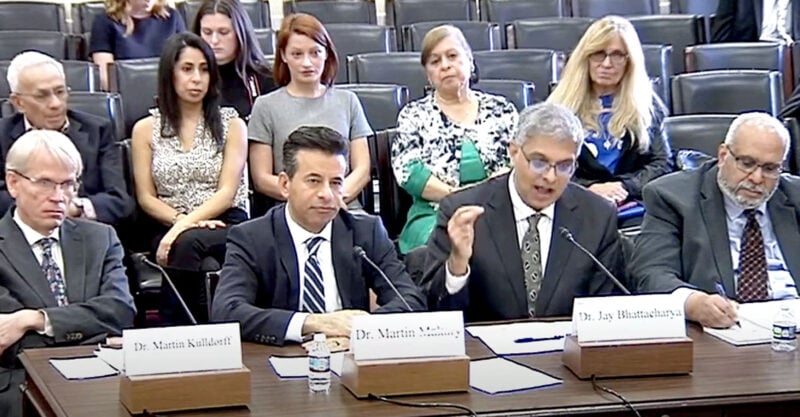by Megan Redshaw, Childrens Health Defense:
 The House Select Subcommittee on the Coronavirus Pandemic on Tuesday presented the testimony of four public health experts, including Martin Kulldorff, Ph.D., who described the government’s response as the “worst public health mistakes in history.”
The House Select Subcommittee on the Coronavirus Pandemic on Tuesday presented the testimony of four public health experts, including Martin Kulldorff, Ph.D., who described the government’s response as the “worst public health mistakes in history.”
Convening for the first time on Tuesday, the Select Subcommittee on the Coronavirus Pandemic presented the testimony of four public health experts, as part of a roundtable: “Preparing For the Future By Learning From the Past: Examining COVID Policy Decisions.”
TRUTH LIVES on at https://sgtreport.tv/
The agenda for the subcommittee, chaired by Rep. Brad Wenstrup (R-Ohio), focused on government policy pertaining to COVID-19, including vaccine mandates and other public health guidance.
In his opening remarks, Wenstrup said the subcommittee will examine the origins of COVID-19, policies surrounding gain-of-function, research, the impacts of lockdowns and other government policies, including school closures, and “vaccine and therapeutic development and the subsequent mandates.”
“We are here to deliver an after-action review of the past three years,” said Wenstrup. “To learn from the past, not just what went wrong, but what was done right, and to prepare for the future. This is work that must be done, must be done thoroughly, and must be done with reverence with an eye toward the truth and based on facts.”
The experts who testified included Jay Bhattacharya, M.D., Ph.D., professor of medicine at Stanford University; Martin Kulldorff, Ph.D., professor of medicine at Brigham and Women’s Hospital; Marty Makary, M.D., M.P.H., chief of islet transplant surgery and professor of surgery at Johns Hopkins University; and Georges C. Benjamin, M.D., M.A.C.P., executive director of the American Public Health Association.
‘Worst public health mistakes in history’
In introducing the experts, Wenstrup said they can “help us chart a path forward; to help us understand what policies went wrong and how we, as a country, can improve.”
Wenstrup cited examples like the vaccine mandates imposed by the Biden administration, ignoring natural immunity, the harm caused to elders forced into nursing homes, and the consequences of stopping in-person learning and implementing remote work, particularly in the public sector.
“The American people deserve to know and understand how and why these impactful decisions were made,” said Wenstrup. “Did we create unnecessary fear in some, and dangerous ambivalence in others?”
“At the end of this process, our goal is to produce a product, hopefully bipartisan, based on knowledge and lessons learned,” he stated.
Ranking member Rep. Raul Ruiz (D-Calif.) focused on American lives lost during the pandemic, stating that it “was real and not a hoax” and “laid bare vulnerabilities and inequities in our public health infrastructure and our economy.”
“We need to understand the lessons, learn all the barriers of misinformation, disinformation, the politicization of this and avoid those for the fake of our nation, in order to save more lives,” Ruiz said.
Most of the witnesses shared critical words about the overall public health response to COVID-19, which Kulldorff described as “the worst public health mistakes in history.”
Makary said “public health officials have made many tragic mistakes during the pandemic,” including:
“Ignoring natural immunity, dismissing the lab leak as a conspiracy, closing schools, masking toddlers … pushing boosters for young people, bypassing FDA [U.S. Food and Drug Administration] expert panel customary votes that we’ve been using for decades, telling people to wash their hands like crazy.”
Bhattacharya said:
“The American people deserve answers to fundamental questions about the pandemic. On what empirical basis were schools closed? Did public health decision-makers consider the harms of their policies as thoroughly as their putative benefits? Why did authorities ignore recovered immunity or failure of the vaccine to prevent disease transmission?”
“Scientists and people vehemently disagreed about the wisdom of lockdowns, school closures, vaccine mandates and discrimination and so much else,” he added. “There’s near-universal agreement that what we did failed.”
Benjamin, the only expert who was generally supportive of the overall public health response, said, “We must remember the limited information we had when we made those decisions … and also the fact that our knowledge base and science continues to evolve over time.”
He added, “We created a safe and effective vaccine by every standard that we understand safety and efficacy today, in record time.”
Wenstrup praised the quick development of vaccines, describing it as “amazing,” but added, “but we knew from the trials that even people that were vaccinated got COVID” and “we also knew that vaccines produce variants and we should be expecting that.”
Citing the early public health response focusing on COVID-19 at the expense of other patients and health issues, he said one of his constituents, an elderly man, had an operation for “a painful hernia” canceled, ultimately resulting in his death.
Several experts addressed this type of inflexibility. Makary said that while “public health officials are not wrong for making recommendations based on the knowledge that they had at the time … that’s not actually what happened.”
“They were wrong because they refused to evolve their positions as the data became abundantly clear,” he said.
Nursing home policies, hospital visitation restrictions ‘a human rights violation’
Kulldorff said one of the two “major failures” of the public health response was “the failure to properly and optimally protect older Americans,” including “nursing home residents.” He described “sending sick people to nursing homes” as “criminal.”
Read More @ ChildrensHealthDefense.org




